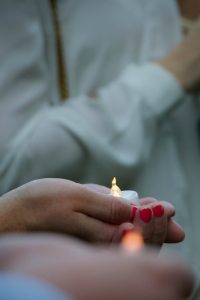
Ole Miss students and staff from the University Counseling Center gathered in the grove for a candlelight vigil on Sept. 8 to spread awareness about suicide.
Since September is Suicide Awareness Month, the university and campus student organizations are striving to show students that they are not alone.
Robin Minyard, a university counselor and speaker at the event, gave a heartfelt speech on the impact of suicide and warning signs for individuals that might be considering suicide. Minyard used her personal experiences to describe the negative consequences of suicide.
“As a survivor, the first thing I want to address is that we react in totally different ways. Our grief is our own,” Minyard said.
The UCC and other UM staff are working to create a safe environment for students in times of
need.
“My main hope was that people would know that we are here 24/7. So you can walk into our office Monday through Friday, eight to five, anytime for a crisis and we’re going to see you after hours. You can call our main number. It turns into a crisis line,” Laura Stiles, a staff counselor, said. “If someone wants to get into the Magee center, and express suicidality, they can walk them over. We all work really well together, and we’re all invested in working as a team to support our university.”
The William Magee Center is hosting a UM Listen Board event on Wednesday,
Sept. 21 at 11:00 a.m. – 1:00 p.m. on the Union Plaza. Wellness education coordinators and other UM staff will use this event to check in on students and see how they are feeling. Students are able to grab a button that reflects their emotions in order to start a conversation about mental health on campus.
“Raising awareness about different mental wellness resources and services helps to break down the negative stigma surrounding mental health issues including suicide,” Jazmine Kelley, coordinator of Wellness Education, said. “The more people talk about mental wellness, the less isolated and ashamed people are likely to feel about their mental health concerns. It is my hope that our students know that it is okay to not be okay and that we are here to help them overcome those struggles.”
Rochelle White, a sophomore psychology major, said that there needs to be a greater emphasis on mental health at the university.
“I think we need to remind students that there’s not a lot of pressure on them academically. Your mental health is so much more important than that,” White said.
According to the UCC, suicide is the second leading cause of death among people ages 10-14 and the third leading cause of death among people aged 15-24. In the United States, 4.9% of all adults, 11.3% of young adults, 18.8% of high school students and 45% of LGBTQ youth all experience serious thoughts of suicide.
“As a suicide survivor, yes, there are things that we can do too, to lessen the chances of suicide,” Minyard said. “But as a survivor, I need not carry the burden of thinking that I could have prevented that suicide. That is not our burden, our burden to carry at this point is what are we going to do with our lives, to honor the loss of our person who died by suicide.”


























